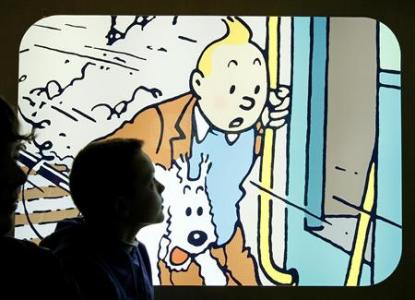Belgians keen to share Hollywood's Tintin with world
Updated: 2011-12-06 09:49
(Agencies)
|
|||||||||
 |
|
A student looks at a lightbox depicting the comic strip character Tintin by Brussels-born author Georges Remi, better known as Herge, displayed in a shop at the Herge Museum in Louvain-La-Neuve December 1, 2011.[Photo/Agencies] |
His adventures have taken him around the world, captured hearts across Europe and courted controversy, but can a computer animated 3D Hollywood blockbuster about a boy journalist from Belgium win over American audiences?
Belgians have flocked to see "The Adventures of Tintin - The Secret of the Unicorn," a new film by director Stephen Spielberg which brings to life the fictional exploits of a cartoon character who is a household name in Europe.
Many in a country where several museums and cafes are dedicated to Tintin's exploits hope that the silver screen treatment from the director who brought us "Indiana Jones," "Jurassic Park" and "E.T." will spread the cartoon hero's fanbase across America when it opens there on December 21.
"Perhaps, since it is Spielberg the reception will be good," said Daniile Van der Schueren, 65, from Brussels.
Brussels-born author Georges Remi, who is better known as Herge, first sent the fictional boy journalist with the tufted ginger hair on adventures in a 1929 comic strip series.
From then until Herge's death in 1983, Tintin and his faithful little white dog Snowy solved some of the cartoon world's most befuddling mysteries and thwarted a series of diabolical criminals with the help of their friends, Captain Haddock, the professor and policemen Thomson and Thompson.
So it's hardly surprising that more than three quarters of a million Belgians went to see the new film in the first five weeks after its October 26 release, according to Sony Pictures.
Belgians, proud of a comic strip history which also includes the Smurfs, Gaston and Lucky Luke hope the movie inspires Americans to delve into the original Tintin books, and to discover more about Belgium.
"I hope now, when people think about Belgium they don't think only about chocolate, about French fries, about mussels, but also about Tintin, which is a part of our history," said Julien Van Noppen, 22, from Brussels.
ROLE MODEL
Adult fans say Tintin provides an excellent role model for children.
"There is a kind of moral lesson -- you have to be brave and you have to be sincere," said Brussels bookseller Anne de Bardzki.
Tintin and Snowy are inseparable in the adventures and Tintin is continually extricating the accident-prone captain from one dire scrape after another.
"Tintin will do everything to save his friends," said Etienne Chevalier, Belgian correspondent for Tintinologist.org, an English language Tintin fan website.
Tintin also teaches restraint. He gets into fist fights and sometimes picks up the bad guy's gun, but never shoots first.
"I read a lot of comics, French, Belgian and Japanese," Van Noppen said. "When you see Tintin, it is really less violent."
While the reception of Spielberg's movie has been generally positive, there has been some criticism in Europe about the Americanization of some action sequences and extensive use of special effects.
HUMOR AND CHARACTERS
Spielberg's movie draws on three of Herge's 24 Tintin adventures and brings his brand of Belgian slapstick humor front and center.
Captain Haddock provides comic relief by continually choosing booze over bravery. The two incompetent policemen, near identical twins, named Thompson and Thomson add to the hilarity by repeating each other's sentences, tripping over crooks and wearing ludicrous disguises that dupe no one.
Some hope the movie will help the image of Belgium, a country that has become the butt of jokes for taking more than 500 days to form a national government after elections in June 2010, and a place where that old question "name 10 (or even five) famous Belgians" continues to flummox most people.
"Tintin is so friendly and welcoming; also he is a clever man," said Francoise Steux, 65. "We don't always see the Belgians as clever, but we are."
While each reader has their own favorite Tintin book, most would place "The Secret of the Unicorn" and its sequel "Red Rackham's Treasure" close to the top of their lists, along with those in which Tintin travels to the moon, -- "Destination Moon" and "Explorers on the Moon," -- versions which were first published 19 years before American astronauts finally landed there in 1969.
CONTROVERSY
Despite their enduring popularity, Herge's comic books are not without controversy and show a darker side to Belgian history -- not least "Tintin in the Congo," which reflects Belgium's colonial past in Africa.
First published in 1930, it has been criticized by many as racist.
Congolese-born campaigner, Bienvenu Mbutu Mondondo, filed a lawsuit in late September alleging racism and demanded the book be banned. In October, a Belgian judicial advisor recommended the country's courts reject the legal bid to ban the book.
Some racist language has been removed from previous editions, but the Africans depicted remain crude caricatures.
"The one in Africa is really difficult to read now, it has terrible way of saying things," de Bardzki said. "You cannot read them to a child now without saying, this is awful, or this you cannot say."
In the past, critics also disapproved of Jewish names being used for villainous characters. Some of these were changed in later editions, but Herge remains controversial because he continued publishing in a collaborationist newspaper, while Belgium was under Nazi control in World War Two.
"He was no progressive man so he just reflected the situation, the way of thinking of ordinary conservative people," de Bardzki said.
Even so, many Belgians and Europeans continue to see Tintin as a universal character, a defender of the underdog and a force for good in the world.











